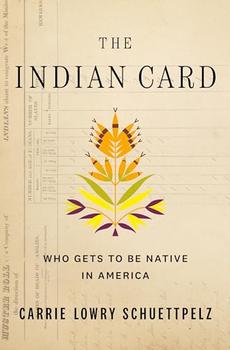
Who Gets to Be Native in America
by Carrie Lowry Schuettpelz
A groundbreaking and deeply personal exploration of Tribal enrollment, and what it means to be Native American in the United States.
Who is Indian enough?
To be Native American is to live in a world of contradictions. At the same time that the number of people in the US who claim Native identity has exploded―increasing 85 percent in just ten years―the number of people formally enrolled in Tribes has not. While the federal government recognizes Tribal sovereignty, being a member of a Tribe requires navigating blood quantum laws and rolls that the federal government created with the intention of wiping out Native people altogether. Over two million Native people are tribally enrolled, yet there are Native people who will never be. Native people who, for a variety of reasons ranging from displacement to disconnection, cannot be card-carrying members of their Tribe.
In The Indian Card, Carrie Lowry Schuettpelz grapples with these contradictions. Through in-depth interviews, she shares the stories of people caught in the mire of identity-formation, trying to define themselves outside of bureaucratic processes. With archival research, she pieces together the history of blood quantum and tribal rolls and federal government intrusion on Native identity-making. Reckoning with her own identity―the story of her enrollment and the enrollment of her children―she investigates the cultural, racial, and political dynamics of today's Tribal identity policing. With this intimate perspective of the ongoing fight for Native sovereignty, The Indian Card sheds light on what it looks like to find a deeper sense of belonging.
"The personal and collective stakes for Native peoples are ably set forth here, and one gains a vivid sense of why establishing more sensible and fair criteria for tribal belonging is so urgent. Greater Native sovereignty is, the author aptly concludes, a worthy and realizable goal. A clear and frank analysis of the challenges that define Native selfhood." —Kirkus Reviews
"Carrie's book is so dang good you need to get two copies: one for you and then the other for a friend. Schuettpelz, with so much research and interviews, shares the stories of people caught in the mire of identity-formation with such ease. The voice is pitch perfect, there is not one wrong word and the content is written with so much grace and elegance and honesty you can't help but finish Schuettpelz's work knowing it will live on for as long as it takes to unravel the many, many contradictions surrounding what it means to Native American today." —Morgan Talty, author of Fire Exit
"A well researched book for readers who are curious or confused about complex kinship relationships in Native America. Armed with personal experience, interviews, and scholarly data, Carrie Lowry Schuettpelz tackles the political nature of Indigenous identity with clarity and concision." ―Deborah Taffa, author of Whiskey Tender
This information about The Indian Card was first featured
in "The BookBrowse Review" - BookBrowse's membership magazine, and in our weekly "Publishing This Week" newsletter. Publication information is for the USA, and (unless stated otherwise) represents the first print edition. The reviews are necessarily limited to those that were available to us ahead of publication. If you are the publisher or author and feel that they do not properly reflect the range of media opinion now available, send us a message with the mainstream reviews that you would like to see added.
Any "Author Information" displayed below reflects the author's biography at the time this particular book was published.
Carrie Lowry Schuettpelz is an enrolled member of the Lumbee Tribe of North Carolina. She spent seven years working in the Obama Administration on issues of homelessness and Native policy. She holds an MFA in Creative Writing from the University of Wisconsin-Madison and a Master in Public Policy from Harvard's Kennedy School of Government. The Indian Card is her first book.




To limit the press is to insult a nation; to prohibit reading of certain books is to declare the inhabitants to be ...
Click Here to find out who said this, as well as discovering other famous literary quotes!
Your guide toexceptional books
BookBrowse seeks out and recommends the best in contemporary fiction and nonfiction—books that not only engage and entertain but also deepen our understanding of ourselves and the world around us.